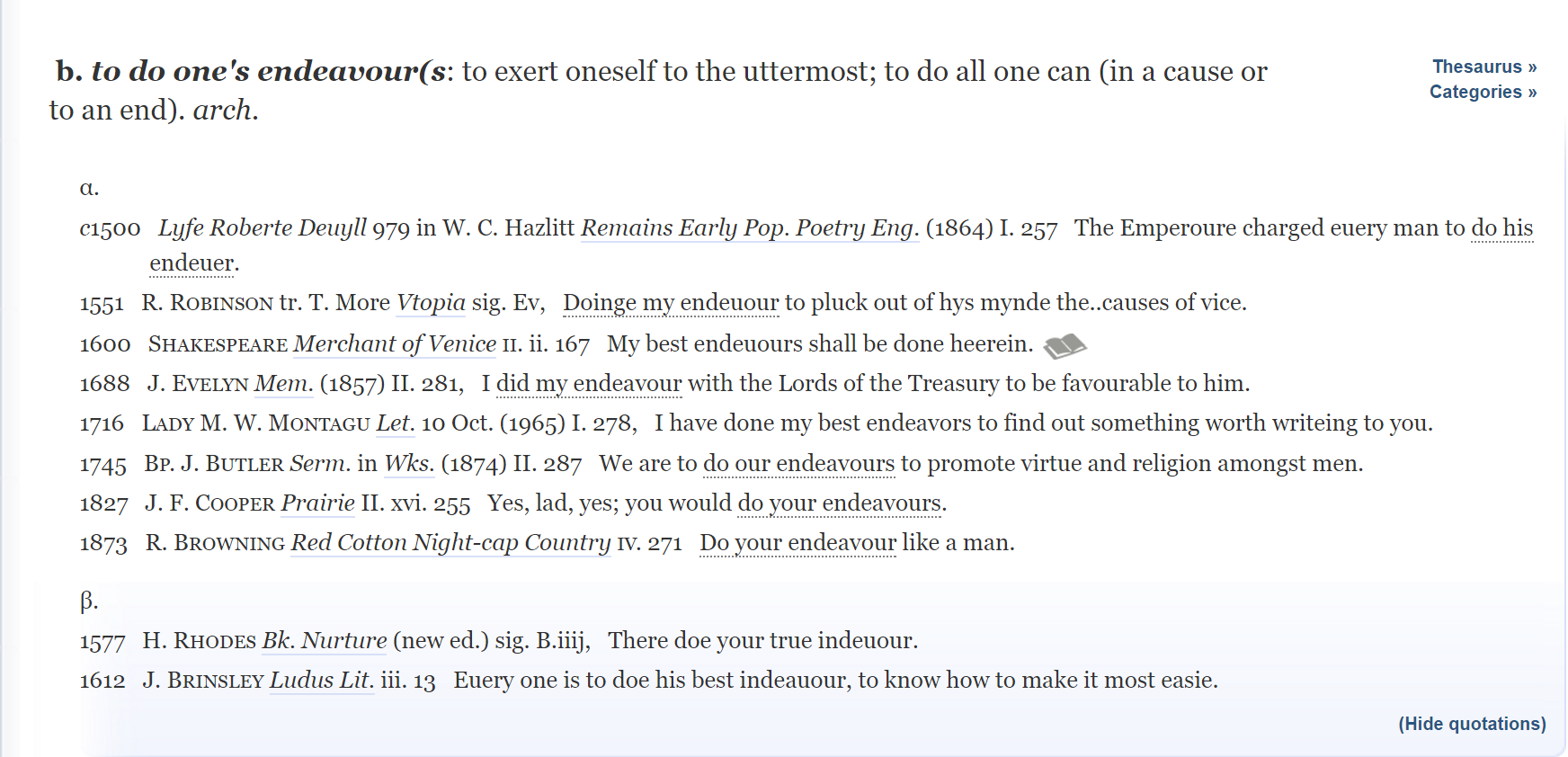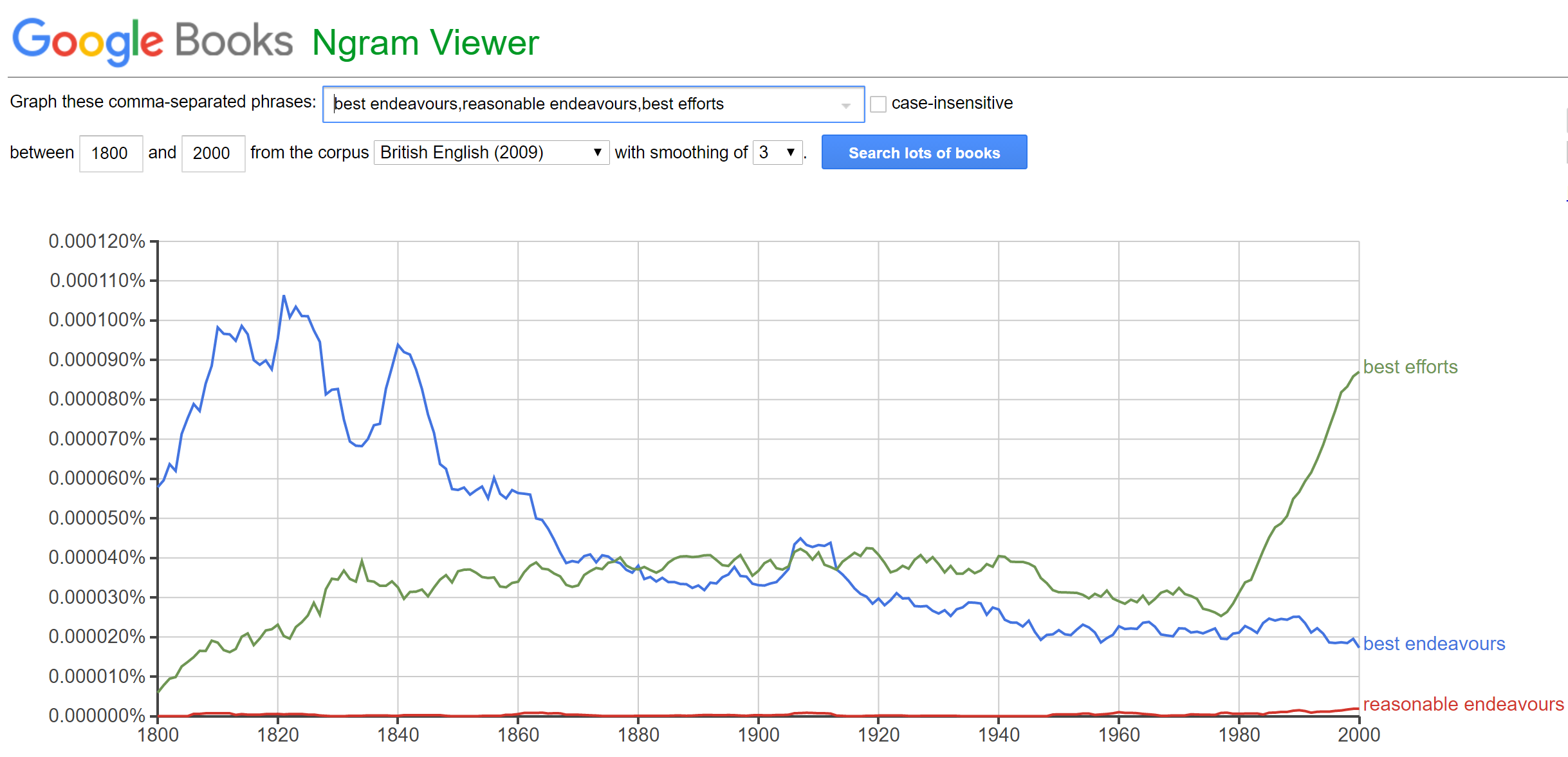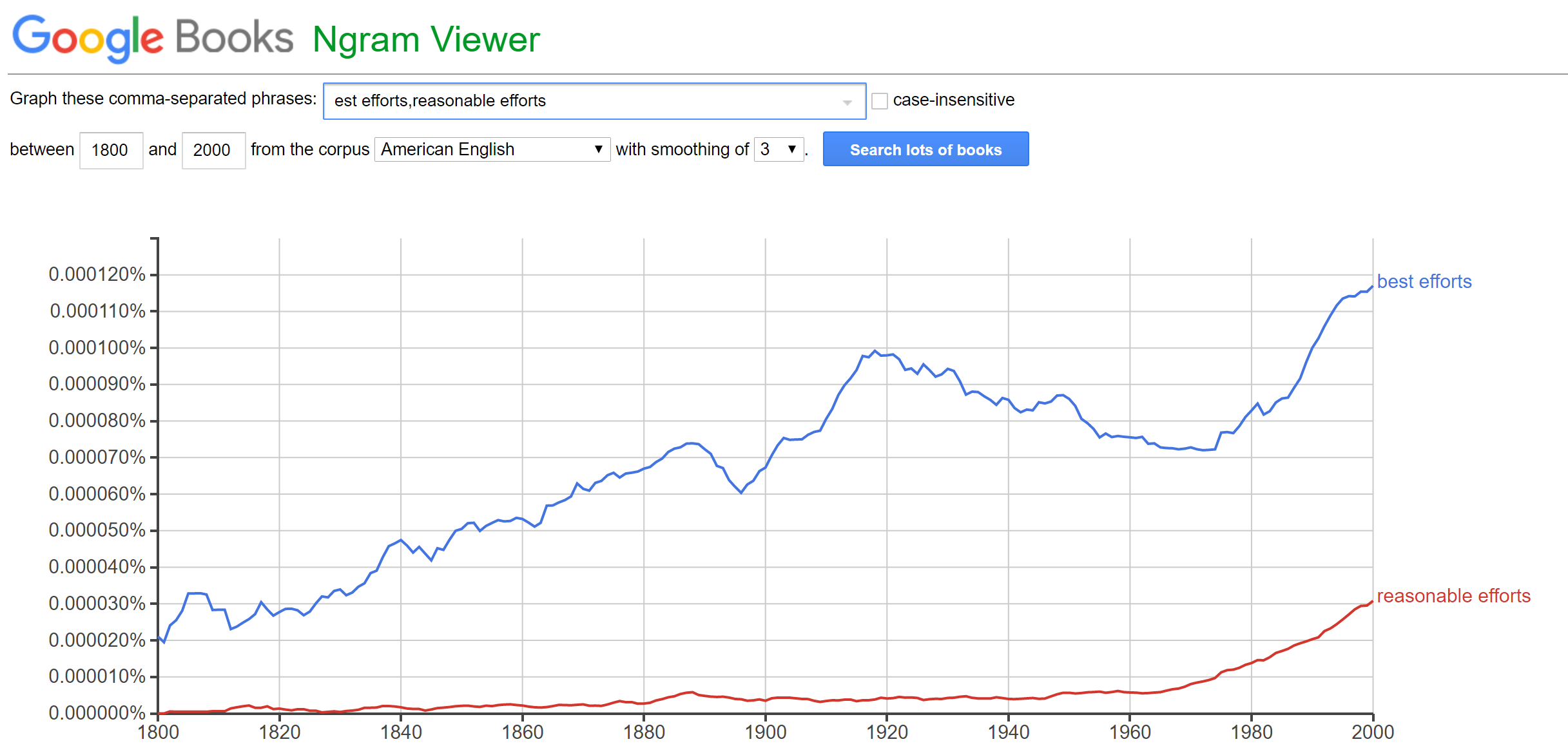In this post yesterday I offered a limited critique of Chief Justice Strine’s dissent in Williams Companies, Inc. v. Energy Transfer Equity, L.P. But one benefit of having a traditionalist contract-drafting notion rear its head periodically is that it forces me to keep refining my arguments. So in this post I explain in greater detail why it makes no sense to suggest that different efforts standards impose varying degrees of onerousness.
The proposition is that whereas a reasonable efforts obligation (or under English law, a reasonable endeavours obligation) requires that one act reasonably, a best efforts (or best endeavours) obligation requires more than that—potentially much more than that. But that proposition doesn’t withstand scrutiny.
The Oxford English Dictionary Doesn’t Mention Reasonable Endeavours
Let’s start by considering the relevant part of the Oxford English Dictionary’s definition of endeavour (the definition of effort doesn’t contain anything comparable):
Evidently the phrase best endeavours is a variant, the original being to do one’s endeavours, meaning “to exert oneself to the uttermost; to do all one can (in a cause or to an end).” OED describes the original formulation as archaic. Three of the ten examples listed include the word best in the phrase, but OED doesn’t suggest that that changes the meaning.
And nothing in OED suggests a variant using reasonable.
Relative Frequency of Use of the Terms Is Inconsistent with the Proposed Distinction
Below is a Google Ngram showing the relative frequency with which the phrases best endeavours, reasonable endeavors, and, for the heck of it, best efforts occur in Google’s corpus of digitized British-English books. For our purpose, what’s significant is that reasonable endeavours is essentially absent until later in the twentieth century.
That’s consistent with OED ignoring the phrase, but it’s inconsistent with the notion that reasonable endeavours imposes a reasonableness standard and best efforts imposes a standard more onerous than that. If reasonable endeavours were the baseline and best endeavours built on that, you’d expect reasonable endeavours to appear much more often in the corpus, just as for best to work, you need good.
The near-total absence of reasonable endeavours strongly suggests that the proposed distinction is an illusion.
The same conclusion is suggested by the Ngram showing the relative frequency with which the phrases best efforts and reasonable efforts occur in the nineteenth century in Google’s corpus of digitized American-English books:
The Distinction Doesn’t Take into Account the Rhetorical Function of Best
What underlies the notion of a distinction between best and reasonable in this context is that if you use best to modify efforts, necessarily you’re referring to efforts that are greater than other efforts.
But that reflects an overly simplistic approach to how the English language works. The word best certainly serves that function—Bring me my best whiskey! But it also can serve as a simple rhetorical flourish. We know that from the OED definition of to do one’s endeavours, with the addition of best not changing the meaning, but it’s also on display in the phrases It’s in your interest and It’s in your best interest. Adding the word best to the latter phrase doesn’t change its meaning. Instead, it simply signals that the speaker cares.
Best as Meaning More than Reasonable Doesn’t Work
If all that weren’t enough, there’s also the problem that if a best efforts obligation is more onerous than a reasonable efforts obligation, then a party that’s under a best efforts obligation might have to act more than reasonably to comply with that obligation. In other words, they might have to act unreasonably. But an obligation to act unreasonably simply doesn’t make sense under contract law. And how unreasonably would the party under the obligation have to behave to comply with the obligation?
The OED definition of to do one’s endeavours suggests an all-consuming effort, but to make sense it has to take into account context. And in contracts, you default to reasonableness in the absence of specificity.
That’s why in all of U.S. caselaw, I’ve found only two cases that have held that different efforts obligations involve different levels of onerousness, and do so without offering any rationale. As I noted in my post on the Delaware opinion, those cases can be considered irrelevant outliers in the face of the mountain of contrary caselaw. In effect, U.S. caselaw stands for the proposition that all efforts standards in effect mean reasonable efforts.
There’s support in English caselaw for the distinction, but that caselaw is a travesty. (Go here for my article about it.) There’s support in Canadian caselaw for the distinction, but it’s unintentionally hilarious. (Go here for my article about it.)
I suggest that increased use of the phrases reasonable efforts and reasonable efforts later in the Ngrams reflects their use as legal terms of art. The sources linked to suggest as much. Those phrases certainly are certainly not in use idiomatically: they’re irrelevant to the broader context. It would appear that drafters uncomfortable with the all-consuming-effort connotations of to do one’s endeavours in everyday English wanted an alternative that was explicitly a reasonableness standard for purposes of contracts. The motive was clarity, as opposed to expressing a different meaning.
Traditional Contract Drafting Contains Plenty that Is Meaningless
Those who support the notion of a distinction between efforts standards belong to the no-smoke-without-fire school of contract interpretation: if enough people who work with contracts believe something, then it must be so!
I’ve heard a U.S. judge and an English judge express exactly this sentiment, plus any number of seminar participants, but it’s naïve. Traditional contract drafting features plenty that simply makes no sense yet remains in contracts. Not because individuals are stupid, but because the system is dysfunctional. It relies on heedless copy-and-pasting from contracts of questionable quality and relevance—what I call “passive drafting.”
What in traditional contract drafting doesn’t make sense? There’s the “successors and assigns” provision (see this article). There’s double materiality (see this post). There’s represents and warrants (see this article). Heck, there’s witnesseth. I could go on. The notion that best efforts imposes a greater degree of onerousness than does reasonable efforts is just more of the same.
Other Distinctions Are Equally Unfounded
One encounters the notion that all reasonable efforts serves to impose an more onerous obligation that does reasonable efforts. That notion requires that one be ignorant of the rhetorical function all, as in with all due respect and all due speed.
There’s also the notion that commercially reasonable efforts serves to impose a more onerous obligation than does reasonable efforts. There’s zero basis, even an unfounded one, for this idea. It’s laughable.
The Proposed Distinction Is Unworkable
It’s no accident that no court has ever articulated a coherent distinction between best efforts (endeavours) and reasonable efforts (endeavours) and applied it to a dispute: the idea is unworkable. If you look around, you might find scenarios proposed for how the distinction is meant to work, but they’re head-scratchingly arbitrary and as such not amenable to rational criticism.
You might find my views on efforts dismissed out of hand, without detailed criticism. It was always thus with traditionalists: ignore my methodical arguments and offer instead propositions that are too flimsy to be worth attacking. That’s why in effect I have the field to myself.
If you can offer more meaningful criticism, please do so.
Use Only Reasonable Efforts
To summarize, there was originally only best endeavours, meaning to do one’s utmost, with best serving merely as a rhetorical flourish. But in the context of contracts, it makes sense to require of a party under a best endeavours or best efforts obligation only that it act reasonably. A standard that requires otherwise is unworkable.
Reasonable endeavours and reasonable efforts were relative latecomers. They were presumably devised by lawyers to express the intended standard more clearly. Nothing suggests two different standards, best and reasonable. And the notion that all reasonable efforts/endeavours and commercially reasonable efforts/endeavours represent yet other standards can be dismissed.
So once more, with feeling: do yourselves a favor and forget all efforts standards except reasonable efforts. And use that carefully. Other efforts standards can be understood as promising more, but they can’t deliver (at least in the United States), and they create confusion (everywhere).




You have persuaded me right over the cliff:
Use ‘efforts’, not ‘reasonable efforts’, because
(1) ‘in contracts, you default to reasonableness in the absence of specificity’, so it’s needless, perhaps even an abominable rhetorical flourish;
(2) inclusio unius, exclusio alterius: if a drafter specifies reasonableness with regard to ‘efforts’, does she run the risk that the omission of a reasonableness qualification elsewhere (eg ‘safe’, ‘clean’) will be read as (a) intentional and (b) meaningful?
(3) The OED (*pause for worship*) says that ‘endeavours’ (efforts) already entails uttermust exertions, so why gild the lily?
The temptation is strong to try to slip one by the other side: ‘If it rains, Acme shall do its endeavours to keep the Outdoor Widgets dry’. Uttermost exertions!
But you say that’s possibly unethical and certainly poisonous to an ongoing business relationship, so *sigh* ‘reasonable efforts’ it is.
What a great post!
Glad you like it. I think it changes the conversation. Game over, case closed.
To understand how idiotic a distinction between reasonable efforts and best efforts is, consider that you’re in effect jumping from the baseline to the superlative with no intervening comparative, and that the intervening comparative (“better efforts”) is inherently ridiculous; “best efforts” is therefore superlatively ridiculous.
Or you could consider “best” an ellipsis for the superlative inflection of “reasonable” (comparators are, as a rule, applied to adjectives and adverbs), so you’d have reasonable, more reasonable and most reasonable…efforts. What, no takers?
Back in the dark ages when I was in law school (under the tutelage of the Langdellian Friars), it was taken as given that an absolute obligation in a contract, without a specified consequence, was in effect nothing more than a reasonable efforts undertaking, since the doctrine of impossibility did not require literal impossibility.
A recent English decision on whether a company had used “all reasonable endeavours” to seek debt finance – Astor Management v Atalaya Mining [http://www.bailii.org/ew/cases/EWHC/Comm/2017/425.html] – largely considering whether the clause in question was certain enough to be enforceable. (Answer, yes, and on the evidence, that obligation had been discharged.)
I wonder what the word “all” adds to “reasonable” here. Without it, would it be possible to use just some (but not all) of one’s reasonable endeavours?
Thanks for this. The answer to your question is a resounding “No,” as explained in this post.
I guess lawyers like to make similar things different. If “all reasonable efforts”, “best efforts”, “efforts” finally are the same. It is a tragedy. I think Civil law provides some tips, Civil law refers to professional standard, defendant’s usual conducts and laymen’s standard in deciding how careful one should be. “Effort” may be treated in a way similar to “Care”. But better alternative would be control by outcome, not by process. To control efforts is not cost efficient.
By the way, Chapter 4 of Drafting International Contract (Marcel Fontaine & Filip De Ly, 2009) is also intereting
Re-reading this post, this paragraph stuck out for me:
>”There’s also the notion that commercially reasonable efforts serves to impose a more onerous obligation than does reasonable efforts. There’s zero basis, even an unfounded one, for this idea. It’s laughable.”
All of my business clients and every opposing counsel I can think of would swear that “commercially reasonable” was somehow less onerous than “reasonable” because a party was only held to what a businessperson would find reasonable and not what a random reasonable person would do. I think that puts in the same realm as successors and assigns, where multiple contradictory meanings are a sign that a phrase has no useful meaning in a contract.
I’ve moved efforts back to DEFCON 1. *sigh*